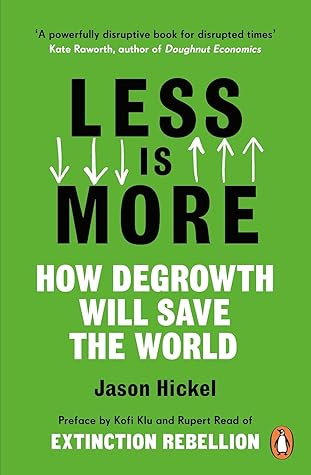More on this book
Community
Kindle Notes & Highlights
by
Jason Hickel
Read between
January 10 - February 12, 2022
as our economy becomes more rational and efficient, it will require less labour.
shorten the working week,
distributing necessary labour more evenly among the working population and maintaining full employment.
retraining programmes can be deployed to ensure that people are able to transition easily from shrinking industries to other kinds of work, so no one gets left out.
public job guarantee (a policy that happens to be resoundingly popular24), so that anyone who wants to work can get a job doing socially useful things that communities actually need, like care, essential services, building renewable energy infrastructure, growing local food, and regenerating degraded ecosystems – paid at a living wage.
Degrowth will free us to reallocate labour to what really matters – to things that have real use-value. Care contributes directly to social and ecological well-being, and participating in caring activities has been shown to be more powerful than material consumption when it comes to improving people’s sense of happiness and meaning, vastly outstripping the dopamine hit we might get from a shopping binge.
working time reduction potentially offers a triple dividend to society: reduced unemployment, increased quality of life, and reduced environmental pressures.’34 Transitioning to a shorter working week is key to building a humane, ecological economy.
gains in labour productivity have been appropriated by capital. Instead of shortening the working week and raising wages, companies have pocketed the extra profits and required employees to keep working just as much as before. In other words, productivity gains have been used not to liberate humans from work but rather to fuel constant growth.
One approach would be to introduce a cap on wage ratios: a ‘maximum wage’ policy. Sam Pizzigati, an associate fellow at the Institute for Policy Studies, argues that we should cap the after-tax wage ratio at 10 to 1.38 CEOs would immediately seek to raise wages as high as they can reasonably go.
Como se haría para incentivar el esfuerzo de mejoría continua? Para incentivar el estudio? Se asemejaría a socialismo en donde pocos desean trabajar conscientemente y hacer las cosas lo mejor posible.
the richest 1% have nearly 50% of the world’s wealth. The problem with this kind of inequality is that the rich become extractive rentiers. As they accumulate money and property far beyond what they could ever use, they rent it out (be it residential or commercial properties, patent licences, loans, whatever). And because they have a monopoly on these things, everyone else is forced to pay them rents and debts. This is called ‘passive income’, because it accrues automatically to people who hold capital without any labour on their part. But from the perspective of everyone else it is anything
...more
The policies I’ve proposed here would lead to a disaccumulation of capital. This would cut rent-seeking behaviour, and the rich would lose their power to force us to extract and produce more than we need. The economy would shift away from unnecessary exchange-value and more towards use-value.
Healthcare and education are obvious ones. But why not the internet? Why not public transport? Why not basic quotas of energy and water? Researchers at the University of London have demonstrated that a full range of what they call Universal Basic Services could be publicly funded (with progressive taxation on wealth, land, carbon, etc.) at costs much lower than we presently spend, while guaranteeing everyone access to a decent, dignified life.41 On top of this, we could invest in public libraries, parks and sports grounds.
Decommodifying basic goods and expanding the commons allows us to improve the welfare purchasing power of incomes, so people can access the things they need to live well without needing ever-higher incomes in order to do so.
Capitalists enclose commons (‘public wealth’) in order to generate growth (‘private riches’), forcing people to work more simply to pay for access to resources they once enjoyed for free. As we create a post-growth economy we can flip this equation around: we can choose to restore commons, or create new commons, in order to render ever-rising incomes unnecessary. The commons become an antidote to the growth imperative.
If scarcity is created for the sake of growth, then by reversing artificial scarcities we can render growth unnecessary. By decommodifying public goods, expanding the commons, shortening the working week and reducing inequality, we can enable people to access the goods that they need to live well without requiring additional growth in order to do so. People would be able to work less without any loss to their well-being, thus producing less unnecessary stuff and generating less pressure for unnecessary consumption elsewhere. And with our extra free time we would no longer have to engage in the
...more
Suddenly a new paradox emerges: abundance is revealed to be the antidote to growth.
Countries loaded with external debts are under heavy pressure to deregulate logging and mining and other extractive industries, plundering ecosystems in order to meet their debt obligations


